Upon the 30th anniversary of the signing of the Oslo Accords, the IDSF’s Research Department is issuing a special booklet called “The Oslo Debacle – 30 Years to the Accords that Changed Israel”.
The research includes an analysis of the decision-making process and its effect on the Israeli society and data on Israel’s security, including fatalities, before and after Oslo; comparison of the funds received by the PA from the international community and West Germany after WWII; special poll among 1,057 Israelis; special research group of 50 Israelis and the process they went through, toward the Palestinians, Israel’s security needs and view of the conflict; the roads paved by the Rabin government as means to entrench security and hold of the territory; new revelations from Palestinian broker Abu Alaa’s personal diary and his view of the negotiations; and in-depth analysis of Israel’s military response to developments on the ground from Oslo, through the 2002 Defensive Shield operation and on to 2023.
We are open to in-person briefing about all of the above analysis. Please contact us for any comment or question.
Click the PDF file for the full booklet.
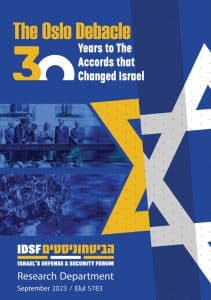
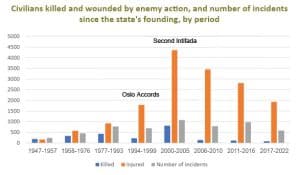
“The statistics reveal a sharp uptick in the annual quantity of fatalities and injuries following the Oslo Accords. The figures are shocking: During the 11 years following the Oslo Accords — that is to say, the years of the 1990s during and after the agreements, plus the Second Intifada —1,018 Israelis were murdered in terrorist operations, amounting to 2.4 times as many as in all the 15 years preceding the Accords. between 1994 and 2022 there were 9.3 times as many Israelis killed and injured in terror attacks as there were during the entire period between the foundation of Israel until Oslo.”
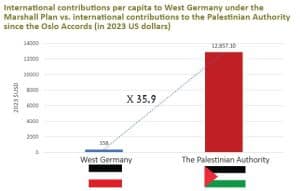
“The Palestinian Authority was rewarded with a series of amenities for the sake of fulfilling its original purpose. International legitimacy, good will, and even perceptible eagerness from the Israeli side for enabling it to succeed, alongside unprecedented financial support. The Palestinians received 35.9 more international financial aid per capita than West Germany after World War II. But while Germany today is a thriving country, with the world’s fourth largest economy, and is Europe’s economic leader, ranked ninth in the global human development index, the Palestinian Authority has left the Palestinians far behind.”
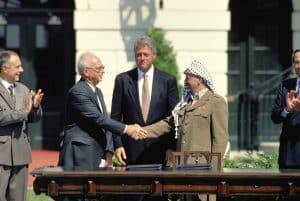
“The underpinning of Yitzhak Rabin’s approach was that the Oslo Accords should be perceived as a process between Israel and the Palestinians, which was taking place with the expectation of reciprocal rewards. However on the Palestinian side, both in the Palestinian Authority and in Hamas, the realization of the power of blackmailing they possessed gradually solidified: The more urgent it became for the State of Israel to disengage as a matter of national interest, the better the Palestinians were positioned to exact an ever more exorbitant price, and of course to reject any agreement to the trajectory of the Rabin Outline.” Major General (res) Gershon HaCohen
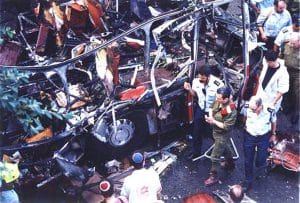
“For their part, the Israeli political and security echelons fell into a recurrent optical adjustment of the reality before their eyes and refused to perceive reality correctly for fear of “spoiling the party”. Thus, indirectly, they allowed the security situation to deteriorate at the cost of thousands of Israeli casualties. both the Palestinians and senior Arab officials elsewhere were astonished that Israel trusted Arafat and brought him in from abroad rather than relying on local leadership. None of the telltale indications stopped the Israeli government on its way to initiating self-imposed disaster. In the period following the Oslo Accords, there were 9.3 times as many Israelis killed and injured in terror attacks as there were during the entire period from Israel’s foundation to Oslo.” Or Yissachar
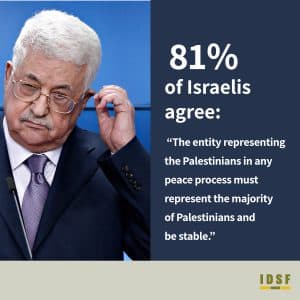
“64% of Israelis believe that the Oslo Accords caused damage to state security. Just 11% of Israelis believe that the Oslo Accords brought Israelis and Palestinians closer. 53% of Israelis believe that interim solutions exist that are somewhere in-between ‘two states for two peoples’ and a ‘binational state’. 77% of Israelis believe that stopping incitement against Israel must be a precondition for any peace process with the Palestinians. Just 11% of Israelis are ready to accept Israeli civilian casualties resulting from terrorist attacks perpetrated while efforts are being made to reach a permanent agreement with the Palestinians.”

“The Prime Minister did not involve the Intelligence Corps in the negotiation process. He even kept them out of the loop. Even when the Accords had been reached and the IDF and Intelligence Corps presented their assessment regarding implementation of its provisions, their opinion was rejected while disregarding their claims outright, not always based on a reasoned explanation or argument, but rather based on translating their wishful thinking into an agreement.” Brigadier General (res) Oren Solomon
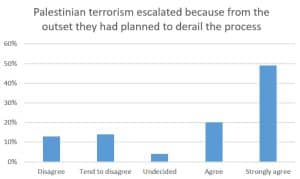
“How does Israeli society regard the effects of the Oslo Process from a 30-year perspective? The Oslo process left a considerable impact on Israeli society, most of which regards control of the Judea and Samaria territories to be a definite security imperative, and regards the residents to be a legitimate population forming an important pillar of principles and security. This perception is a significant change compared with opinion toward a peace process with the Palestinians in the 1990s.” Colonel (res) Ronen Itsik
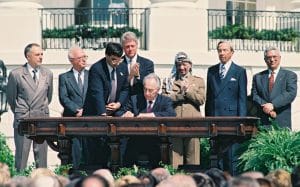
“In Abu Alaa’s view, many of Israel’s leaders ‘wanted to cut the ribbon’ concluding the Oslo process… Israelis and Palestinians should have been left to negotiate directly, without American mediation… Per Arafat, This is the first time in history that Palestinians are changing direction.” Colonel (res) Baruch Yedid

“The construction of a system of transportation from Judea and Samaria to the centers of employment in Israel was the primary cause that stimulated population growth and serves until today as the most significant factor motivating people to move to these areas. There are even those who would say that the physical linkage of Judea and Samaria to central Israel was the first phase of the slow process in which the settlement enterprise made its way into the Israeli public consensus.” Major (res) Lilach Eshtar

“Despite the continuing terrorist attacks, the IDF did not alter its course of action. the IDF and the security apparatus faced considerable challenges in countering terrorism and establishing a favorable tactical and operational position. This difficulty arose because the IDF and security organizations lacked a significant presence and control on the ground. it is only in extensive military operations, where the IDF can effectively encircle the area and respond swiftly, that there is a realistic chance of substantially dismantling most of the terrorist organizations’ military infrastructure, disrupting the senior leadership, and neutralizing the leadership and operatives who form the core of the enemy’s strength.” Dr. Omer Dostri
